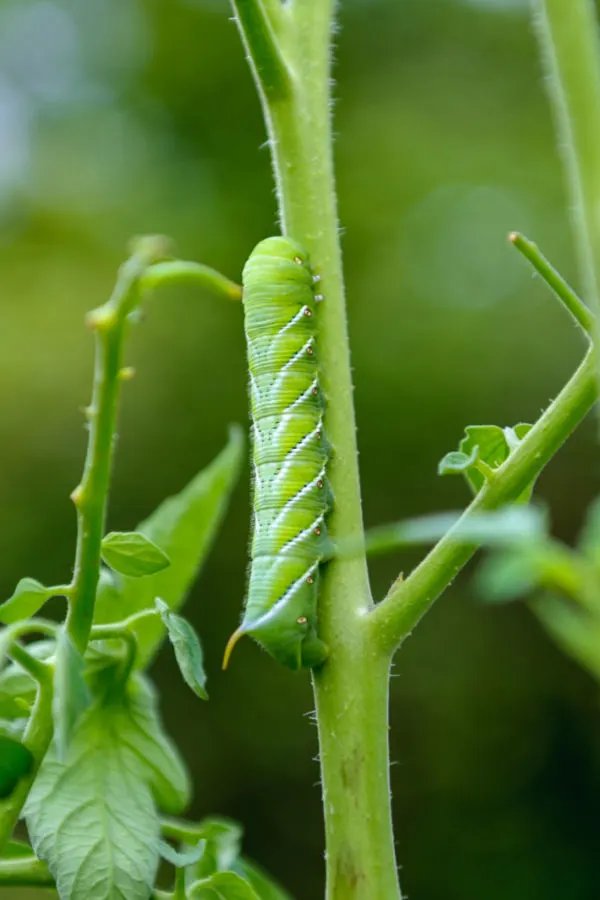
You see, hornworms are the larvae of the sphinx moth and love to munch on plants, especially tomatoes, peppers, and eggplants. The good news? With the right companion planting strategies, you can both deter these garden invaders and promote healthier growth in your plants. Think of it as a team effort—some plants naturally help each other fend off pests like hornworms. Let’s explore what works and how you can set up your garden for success.
What Are Hornworms?
Hornworms are the larvae of the sphinx moth, and they can grow up to 4 inches long. Their bright green bodies blend in perfectly with the foliage of your plants, making them tough to spot. If you catch one, you’ll notice they have a distinct hornlike projection on their back, which gives them their name.
These little guys are ravenous eaters, especially fond of nightshade plants like tomatoes and peppers. A few hornworms can strip a plant of its leaves in a matter of days. Imagine waking up to find your thriving tomato plant looking like a skeleton overnight!
But don’t panic! While they can be a nuisance, there are ways to manage them without resorting to harmful pesticides. Understanding their life cycle and behavior is the first step in tackling these pests effectively.
Companion Planting: The Basics
Companion planting is all about planting different crops close together for mutual benefit. This could mean enhancing growth, repelling pests, or even improving flavors. Think of it as arranging a dinner party where the right guests make for a fun evening, while the wrong ones could ruin the vibe.
Some popular companion plants are known for their pest-repelling properties. For example, marigolds release a scent that helps deter harmful insects, while basil can enhance the flavor of tomatoes. Pairing them with your favorite crops can lead to a healthier garden.
The beauty of companion planting lies in its natural approach. Instead of battling pests with chemicals, you work with nature. This method encourages biodiversity in your garden, creating a more resilient ecosystem. Isn’t that a win-win?
Plants That Deter Hornworms
You might be wondering how to keep those pesky hornworms at bay. Luckily, there are several companion plants that can help protect your garden. Here’s a quick rundown of a few effective choices:
- Marigolds: These vibrant flowers aren’t just pretty; they repel a variety of pests, including hornworms.
- Basil: Not only does it enhance the flavor of tomatoes, but it also helps ward off insects that might attract hornworms.
- Nasturtiums: These dynamic plants can divert pests away from your more precious crops.
Planting these alongside your tomatoes and peppers can create a protective barrier. It’s like having a security system that doesn’t make you hire an expensive guard!
When planting, try to intersperse these protective plants throughout your garden rather than grouping them together. This way, you create a more effective barrier that hornworms might not want to cross.
How Companion Plants Boost Health and Growth
Companion plants not only help keep hornworms away, but they also promote better growth for your main crops. Certain plants improve nutrient uptake, while others can enhance soil health.
For example, legumes like peas and beans fix nitrogen in the soil, benefiting neighboring plants that thrive on richer soil. Meanwhile, deep-rooted plants can draw nutrients from deeper in the ground, making them accessible to shallow-rooted companions.
Imagine a community potluck where everyone brings a dish to share—together, they create a feast! Similarly, companion plants share resources and contribute to a healthier garden ecosystem.
Furthermore, the presence of companion plants can attract beneficial insects like ladybugs and lacewings. These little allies feast on aphids and other pests, giving you an extra layer of protection against hornworms and other garden troublemakers.
Timing and Planting Techniques
Timing is crucial in companion planting. You want to make sure your companion plants are established before your main crops go in, which usually means starting seeds indoors or planting them early in the season. This way, they can get settled and start doing their job before hornworms show up.
When planting, think about using a combination of direct sowing seeds and starting plants indoors. For example, you could start your tomatoes inside and plant marigolds or basil in the garden bed a few weeks earlier. Once the tomatoes are ready to go outside, your companions will already be thriving.
Additionally, consider using raised beds or containers for better control over your plants. This can make it easier to manage pests and keep everything organized.
Monitoring and Managing Hornworms
Even with companion plants in place, it’s essential to keep an eye on your garden. Regular checks can help you catch hornworms early before they cause too much damage. Look for signs like missing leaves or droppings on the ground, which are telltale indicators of these little munchers.
If you spot a hornworm, don’t panic! Hand-picking them off your plants can be surprisingly effective. Just wear gloves if you prefer, and drop them into a bucket of soapy water to dispose of them.
Another natural method is to introduce beneficial insects like parasitic wasps, which lay their eggs on hornworms, ultimately killing them in a way that’s all part of nature’s cycle.
If you’re feeling adventurous, you can also plant a trap crop—something that hornworms love even more than your main crops. This way, they’ll go for the trap crop, leaving your tomatoes and peppers relatively untouched.
Incorporating companion planting strategies into your gardening routine can make a huge difference when dealing with hornworms. By understanding what plants work well together, you can create a healthy, balanced ecosystem that keeps pests at bay while enhancing the growth of your beloved plants.
Remember, gardening takes a bit of experimentation to find what works best for you. So, don’t hesitate to get your hands dirty, try different combinations, and observe what happens. With patience and care, you can transform your garden into a thriving paradise—hornworm-free!

